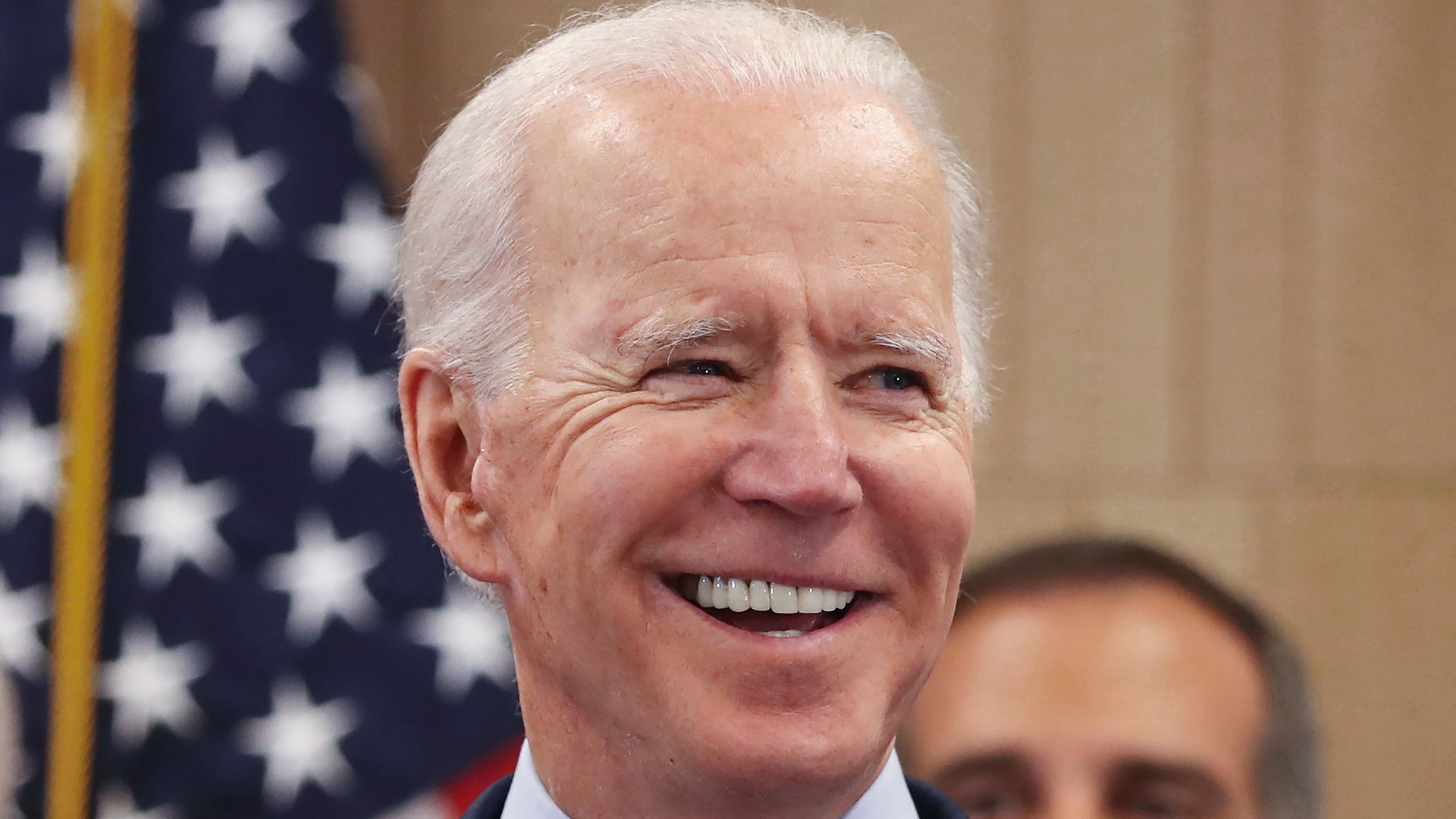Joe Biden elected president, AP projects
Add Axios as your preferred source to
see more of our stories on Google.

Biden in Los Angeles in March. Photo: Mario Tama/Getty Images
The Associated Press projects Joe Biden has been elected the 46th president of the United States, ousting President Trump after a single term marked by impeachment, constant battles, a disastrous response to the deadly coronavirus pandemic and an unexpectedly close election.
Kamala Harris will join him as the first woman and first female person of color to be elected vice president — a historic breakthrough largely overshadowed by the turmoil surrounding the election. The news drew cheering crowds to the White House, while Biden made plans to address the nation at 8 pm Eastern.
- Biden's projected win in Pennsylvania gives him more than the needed 270 electoral votes, per AP, on top of the news service's previous projected wins in Wisconsin and Michigan. A raft of television networks also made the call, with CNN leading the way.
- The AP makes its projections based on exit polls, actual returns and an extrapolation of historic trends affecting outstanding votes. Results become official as each state finishes counting the vote and certifies its returns.


What he's saying:
"I am honored and humbled by the trust the American people have placed in me and in Vice President-elect Harris. In the face of unprecedented obstacles, a record number of Americans voted. Proving once again, that democracy beats deep in the heart of America."— Biden statement
Driving the news: Early results showed Trump leading, but the balance tipped back in the former vice president's favor following continued counts in a half-dozen critical battleground states. Biden claimed the bulk of a high volume of early and mail-in ballots many Americans used to vote safely during the pandemic.
In his own statement, Trump declared "this election is far from over." Starting Monday, he said, "our campaign will start prosecuting our case in court to ensure election laws are fully upheld and the rightful winner is seated."
- "I will not rest until the American People have the honest vote count they deserve and that Democracy demands.”
- The Trump campaign has filed lawsuits in Michigan, Pennsylvania and Georgia, and is backing a lawsuit in Nevada. It also says it will ask for a recount in Wisconsin.
The big picture: In remarks even before his victory was declared, Biden sought to unite a country that's been divided the past four years - fueling historic turnout for both candidates this week.
- "We may be opponents but we're not enemies; we're Americans," Biden said Friday night. "No matter who you voted for, I'm certain of one thing: the vast majority of 150 million Americans who voted, they want to get the vitriol out of our politics."
- An ongoing challenge for him is Trump is unlikely to cede the public spotlight, even out of office.
Biden has vowed to reverse course from Trump's policies on nearly every domestic issue from health care to climate change to economic policy, structural racism and police reform — and most foreign policy approaches.
- He pledged to take a hard line of his own on China — though he says he'd work with allies rather than going it alone — but also has promised a tougher line on Russia than Trump took.
- Biden has moved to the left on several issues — including crime, climate, immigration, health care, and education — to keep pace with the shifting center of gravity in the Democratic Party. Progressive Democrats vowed to push for more, but the election results may undercut them.
- Biden's inner circle is mostly white and male, with more centrist leanings than the newest generation of Democratic Party leaders. That will increase pressure on him to recruit a younger and more diverse Cabinet — but Republican strength in the Senate could block any statement picks.
Biden's biggest immediate shift from Trump will likely be seen in his approach to handling the coronavirus pandemic.
- He has said he'll encourage elected officials throughout the country to require people to wear masks, and says he'll require them on federal property — a marked contrast to Trump, who has held numerous events and rallies full of crowds without masks.
- Biden has also promised a national testing plan and will push Congress to pass a funding bill for an ambitious public health and economic response by the end of January.
- On Monday, he plans to name a COVID task force - even before announcing any staff or cabinet appointments - in a sign of the primacy he will give the pandemic, Axios' Hans Nichols reports.
The backstory: Biden, 77, was known as a center-left Democrat during his lengthy career in the Senate and won his party's nomination this year by presenting himself as a centrist counterweight to more progressive Democrats like Bernie Sanders and Elizabeth Warren.
- He served in the Senate for 36 years, serving as chair of the Judiciary and Foreign Relations committees, and often tells stories about his ability to work with Republican colleagues as well as Democrats.
- He ran two unsuccessful presidential campaigns before becoming Barack Obama's vice president — a move that elevated his profile and made him an instant frontrunner in 2020 after he passed on a run in 2016.
- Biden nearly fell short in the primaries, and was in danger of being knocked out of the race after crushing defeats in Iowa and New Hampshire. But after a solid win in South Carolina, the party unified behind him quickly, and he was on his way to his showdown with Trump.
Editor’s note: This story has been corrected to note that Harris will be the first woman of color to be vice president, not the first person of color. Charles Curtis, Herbert Hoover's vice president, was a member of the Kaw Nation.
